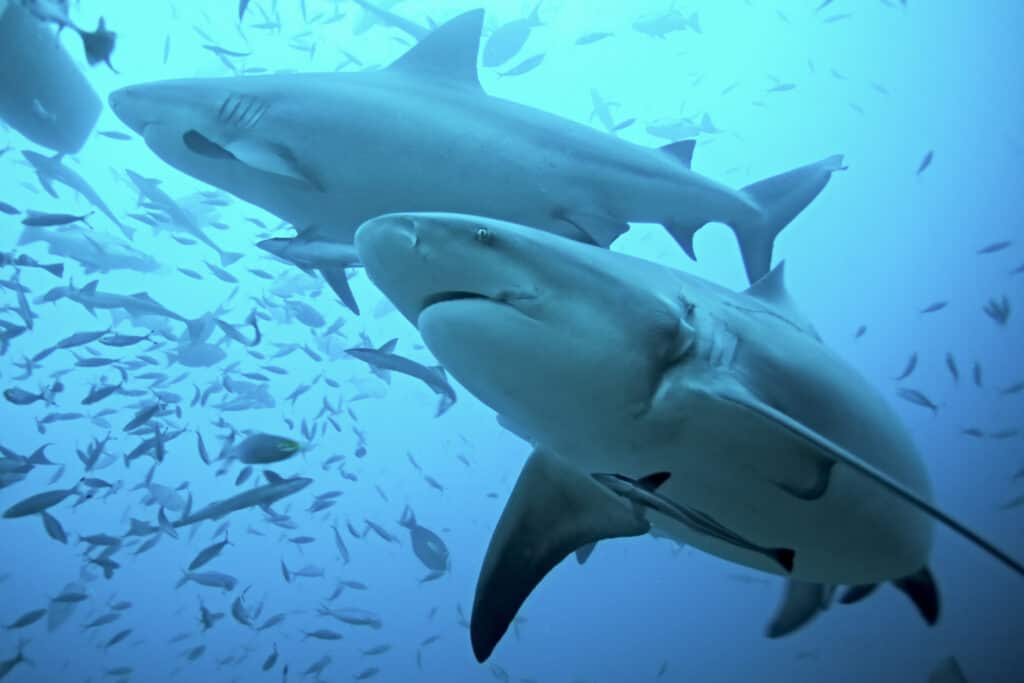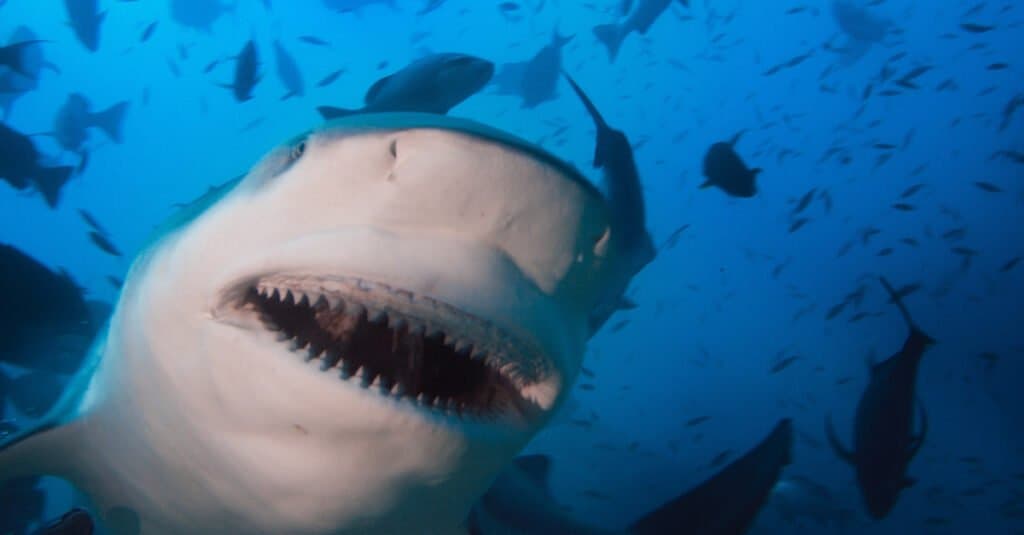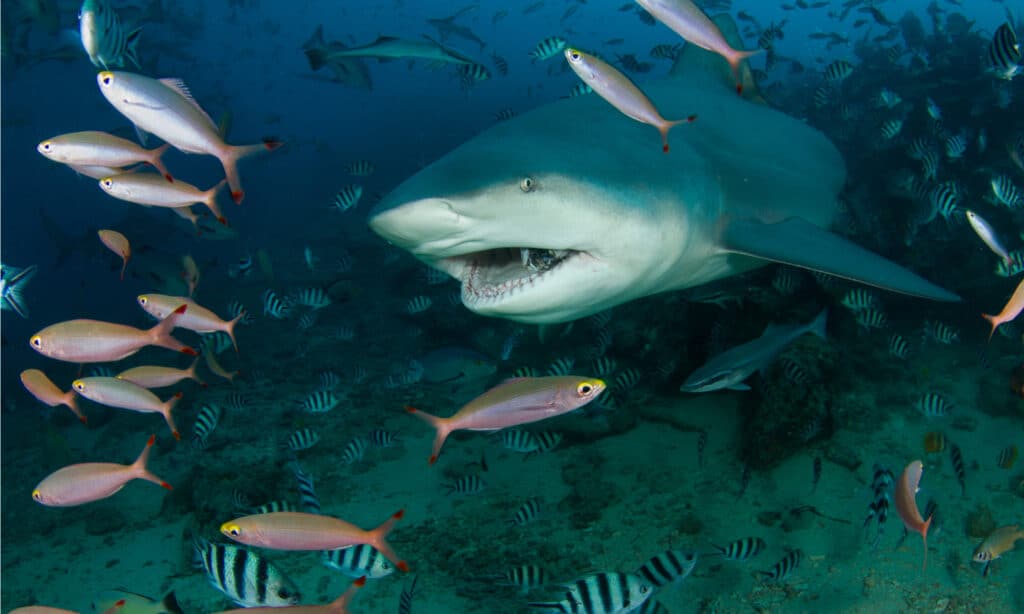Bull sharks (Carcharhinus Leucas) are one of the popular species of sharks in the water. The name “bull” comes from their snout shape. They are short and blunt, just like bulls. Their aggressive nature also makes the name fitting.
There are many interesting facts about these animals. However, it is essential to note this shark’s natural habitat and location. This post shares all you need to know about where bull sharks live.
Where Do Bull Sharks Live?

The Pacific Ocean houses bull sharks near Ecuador and the Amazon River.
©Martin Prochazkacz/Shutterstock.com
Bull sharks live in warm oceans worldwide. These sea beasts prefer warm waters and tend to venture to the shores and coastal areas of these waters. While they like the warm water of the oceans, they are also comfortable in freshwater.
Bull sharks are shallow dwellers. That means they like to swim close to the surface and the beach. They can be found in lakes, rivers, and all sorts of water. They also live in different oceans across the world.
Additionally, you will find bull sharks in southern parts of Brazil, Morocco, and Angola; these are the ones that live in the Atlantic Ocean. The Indian Ocean also has bull sharks living comfortably. They are common in South Africa, India, Vietnam, and Australia in the Indian ocean.
Interestingly, the Pacific Ocean also houses bull sharks near Ecuador and the Amazon River. They are not limited to salt waters; hence they have a unique presence in freshwater like Lake Nicaragua. These are the shark’s significant locations.
Do Bull Sharks Attack Humans?
Bull sharks are one of the most dangerous sharks known to man. Among the many aggressive shark species, only the great whites are said to be more dangerous than bull sharks. They attack men more frequently than even the stats suggest.
Bull sharks are aggressive fish in nature. They are also territorial, meaning they like to mark and protect boundaries from intruders. Besides, they are shallow dwellers; hence they only live in water parts that are accessible to humans.
All these factors make contact with humans almost inevitable. When they come in contact with humans, they attack aggressively. Studies have shown that a lack of clear identification may cause people not to recognize bull sharks’ attacks and attribute the attack to other species of sharks.
If you live in an area with bull sharks sightings, the best is to avoid the shallow waters.
Do Bull Sharks Live Close To The Shore?

Bull sharks are shallow dwellers.
©Willyam Bradberry/Shutterstock.com
Many species of sharks hunt close to the beaches. However, these species often go deep in the waters when they are not hunting. Bull sharks, in this regard, are different. They don’t just go to the shallow waters to hunt. Bull sharks also prefer the shallow waters for dwelling and territoriality.
Because they also live in freshwater, they often dwell in lakes and streams. Moreover, they live close to the surface and the shores of these waters.
How Long Do Bull Sharks Live?
An average bull shark can live for about 16 years. Some bull sharks live up to about 25 years. They mature between the age of 8 to 10 years.
One incredible fact about bull sharks is that they do well in captivity. Some species of sharks, like the whale shark, die at a young age when in captivity. Bull sharks, however, do more than adjust to the captive life; they excel. A bull shark in captivity can live up to 32 years.
That is a couple of years more than the life expectancy in the wild.
How Many Bull Sharks Are Left In The World?

There are around 100,000 bull sharks left in the wild.
©chatchai kusolsinchai/Shutterstock.com
Although there is no exact figure, there are likely around 100,000 bull sharks left in the world. Despite their aggressive nature, these sharks are still a target for shark hunters, which is why they are considered near-threatened animals.
They don’t dive deep; hence, capture requires little effort. Hunting is one of the significant factors that is affecting the population of bull sharks worldwide. However, they face other forms of threat such as pollution.
The fact that these animals live close to the shores means they meet the effect of shore pollution more than any other animals. Coastal development, refuse, oil spillage, and many more types of pollution affecting saltwater and freshwater affect the bull shark population.
Bull Sharks Adaptation
Bull sharks have particular adaptations that allow them to live in all types of water. Generally, sharks need to keep salt in their bodies to survive. Hence, they can only live in salt waters. However, bull sharks are not bound by this limitation.
They have a unique adaptation that allows their kidneys to function in freshwater. They reserve salt in their system and use it when necessary. Bull sharks also have special glands near their tails that help to store salt in the body.
Interestingly, scientists do not fully understand the adaptive reason behind this feature. Because they thrive wonderfully in saltwater, many studies are going into why they also need to live in freshwater.
Digestion slows down when bull sharks do not have much to eat. This process allows them to eat and survive on a few fish. When attacked, they vomit consumed fish to distract the predator. This shark does that hoping the predator focuses on the vomited food while escaping. Smart one, bull!
The photo featured at the top of this post is © HakBak/Shutterstock.com
Thank you for reading! Have some feedback for us? Contact the AZ Animals editorial team.






